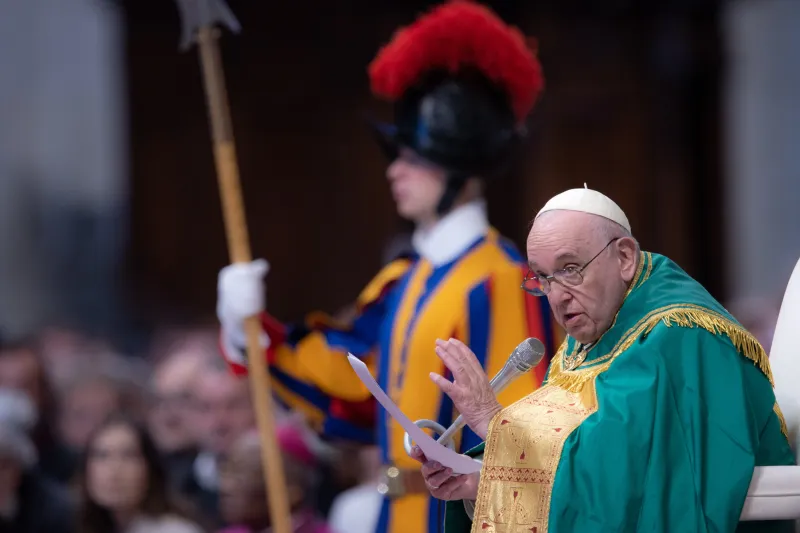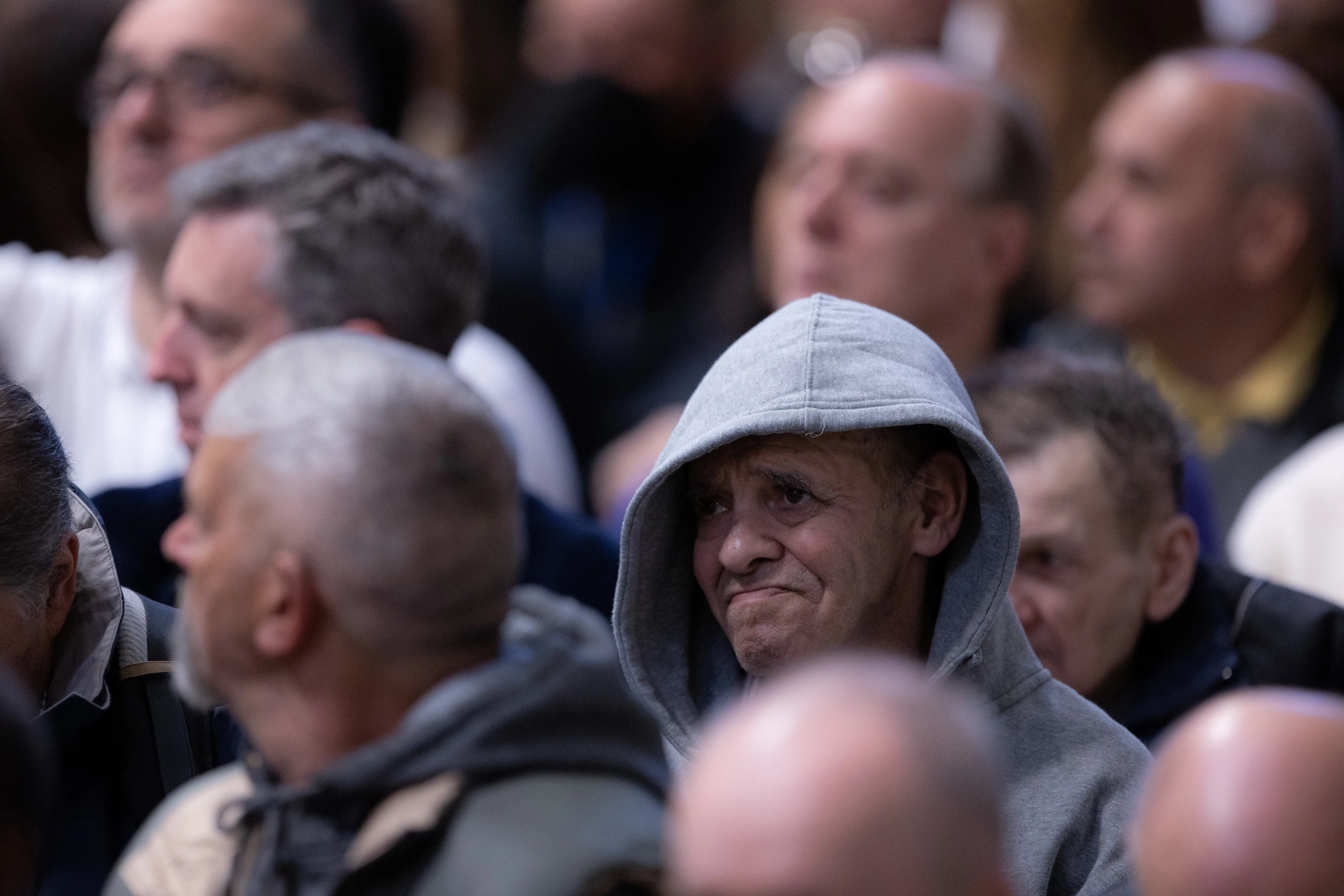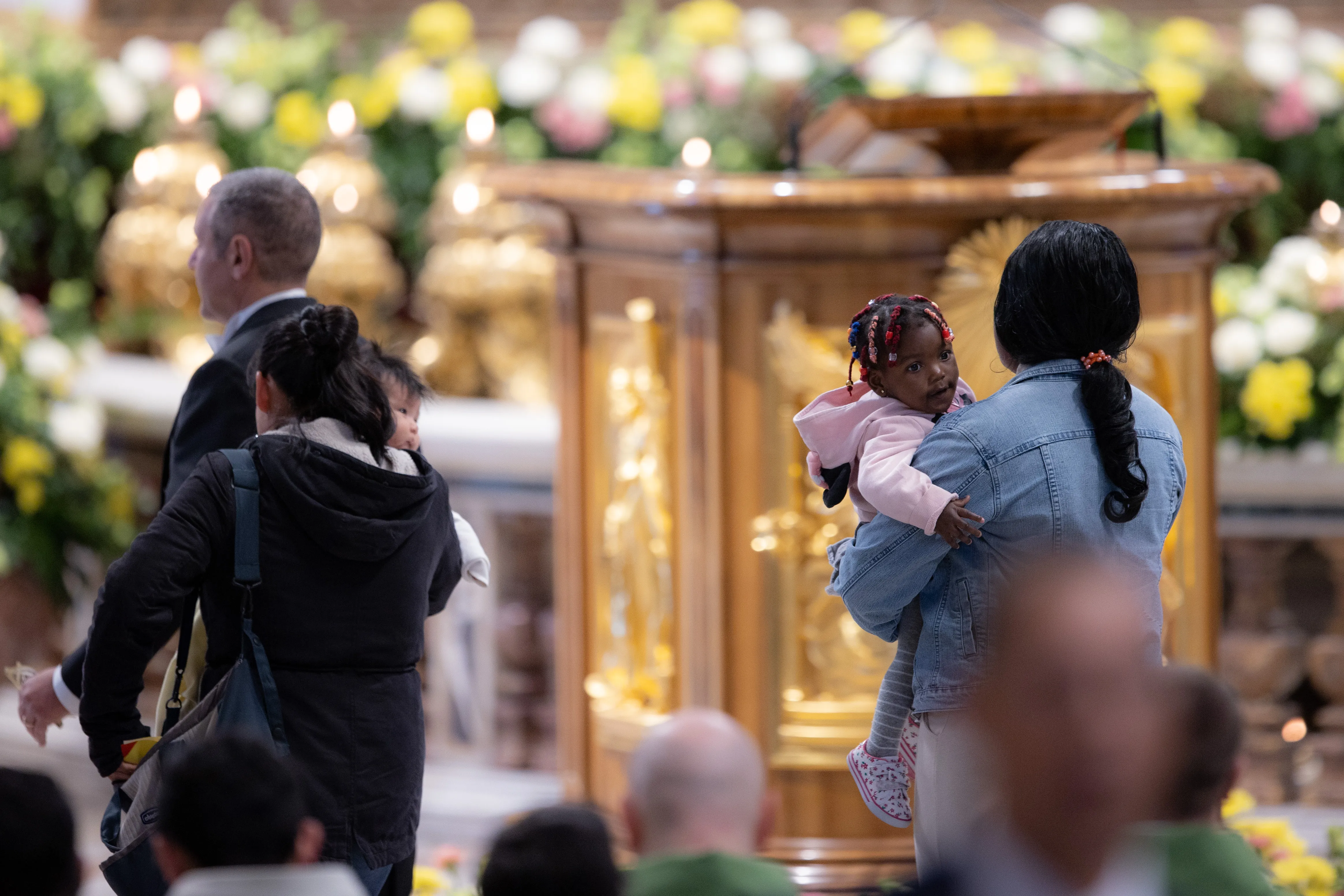
Vatican City, Jul 1, 2025 / 14:47 pm (CNA).
The leader of Africa’s Catholic bishops pushed back Tuesday on the narrative that it was only Africans who objected to a 2023 Vatican declaration permitting blessings for same-sex couples.
“The position taken by Africa [on the declaration] was also the position of so many bishops here in Europe. It’s not just an African exception,” Cardinal Fridolin Ambongo Besungu, OFM Cap, told EWTN News on July 1.
The 65-year-old cardinal added that homosexuality is fundamentally a “doctrinal, theological problem,” and Church moral teaching on the subject has not changed.
Ambongo is archbishop of Kinshasa in the Democratic Republic of Congo and heads the Symposium of Episcopal Conferences of Africa and Madagascar (SECAM).
After the Vatican’s Dicastery for the Doctrine of the Faith (DDF) published Fiducia Supplicans on Dec. 18, 2023, Ambongo flew to Rome, where he met with Pope Francis to convey the dismayed reactions of the bishops in Africa to the declaration, which permitted nonliturgical blessings of same-sex couples.
According to Ambongo, he worked with the head of the DDF, Cardinal Víctor Manuel Fernández, and with Pope Francis to produce a statement that the permission for same-sex blessings did not apply in Africa. The Jan. 11, 2024, statement from SECAM quoted the Bible’s prohibitions of homosexual acts and called same-sex unions “intrinsically corrupt.”
On Jan. 4, 2024, the DDF had issued a statement acknowledging that pastoral contexts in different countries could require a slower reception of the declaration.
Later in January 2024, Pope Francis defended the declaration and called the Church in Africa “a separate case.” In an interview with Italian newspaper La Stampa, Francis said: “For [Africans], homosexuality is something ‘ugly’ from a cultural point of view; they do not tolerate it.”
Ambongo, who spoke to EWTN News after a Vatican press conference to present a document on climate justice and ecological conversion, said that Africa “experienced [Fiducia Supplicans] as something that was being imposed from outside on a people that has other priorities.”
“The pastoral priority for us is not a problem of gay people, it’s not a problem of homosexuality. For us, the pastoral priority is life: How to live, how to survive,” he added. Themes such as homosexuality “are for you here in Europe, not for us in Africa.”
The cardinal, who was a member of Pope Francis’ advisory Council of Cardinals — sometimes referred to as the “C9” because for most of its history it consisted of nine cardinals — said he does not know if Pope Leo XIV will form a similar group to advise the pope.
Ambongo said during pre-conclave meetings, cardinals expressed a desire for the pope to value the input of the entire College of Cardinals, possibly even holding annual meetings. “But this small group that could also help the pope, that depends on him,” he said.
If you value the news and views Catholic World Report provides, please consider donating to support our efforts. Your contribution will help us continue to make CWR available to all readers worldwide for free, without a subscription. Thank you for your generosity!
Click here for more information on donating to CWR. Click here to sign up for our newsletter.








A battle made to be culturally regional by Europeans is more a convulsion of our universal human nature to a toxin detrimental to life.
Our Mystical Body envelopes a multicultural humanity, Europeans the first to receive the Gospels from Jerusalem, freed from ancestor worship, minds opened to discovery and order. At a time when Europe reached a zenith, speculation and loss of faith it degraded intellectually. Its power extended south to Africa and with it its Christian faith.
Missionaries remained the vibrant manifestation of Christ to the world Africa emerging from life in a primordial environment responded with a sense of deliverance. Despite slavery, inhuman exploitation the African spirit endured, thrived. Christ, for the African, was deliverer and model. Homosexuality had its devastating effect in the heart of Africa men subject to brutal conditions imposed by Europeans and Muslims. Disease, Aids killed many.
African prelates like Ambongo have no time for intellectually sophisticated arguments, readily perceived as affectations and hollow. Merely weak excuses for the depravity of the once noble European character. The European missionaries that taught and died to bring them the faith left them with lasting, heroic examples of the faith.
Rather than the backward African as perceived from the jaundiced vision of men like Cdls Jean-Claude Hollerich, Walter Kasper Cardinals such as Ambongo and his episcopal confreres, through the mysterious workings of the Spirit possess the vision of Christ.
Finally, a Catholic bishop who can speak out boldly against the homosexualist agenda in the Church. Maybe other bishops can find the courage to do likewise. Doubtful, but we’ll see.
A relief to hear again from Cardinal Ambongo, and may we hear more from St. Augustine’s Africa and many others. Other particular Church’s within the universal Catholic Church also rejected Fiducia Supplicans, many from Europe:
Poland, Hungary, Kazakhstan, Peru, the Netherlands, Ukraine, parts of Spain and Argentina, the Coptic Church, and even the Orthodox Churches, including Metropolitan Hilarion from Budapest of the Russian Orthodox Church, who expressed “great shock when he read this document.” Very ecumenical! And then, there are still others: https://www.lifesitenews.com/news/breaking-priests-scholars-ask-church-leaders-to-request-the-pope-withdraw-fiducia-supplicans/
Cardinal Mueller, the former Prefect for the Congregation (now split in two and demoted to a dicastery) for the Doctrine of the Faith, even addressed the question whether Cardinal Fernandez’s fanciful Fiducia Supplicans crossed the line into heresy, or not (not a formal heresy, but an enabler): https://www.firstthings.com/web-exclusives/2024/02/does-fiducia-supplicans-affirm-heresy
And, at least nine dioceses in France.
Romans 1:26-27
New International Version
26 Because of this, God gave them over to shameful lusts. Even their women exchanged natural sexual relations for unnatural ones. 27 In the same way the men also abandoned natural relations with women and were inflamed with lust for one another. Men committed shameful acts with other men, and received in themselves the due penalty for their error.
1 Corinthians 6:9-11
New International Version
9 Or do you not know that wrongdoers will not inherit the kingdom of God? Do not be deceived: Neither the sexually immoral nor idolaters nor adulterers nor men who have sex with men[a]
10 nor thieves nor the greedy nor drunkards nor slanderers nor swindlers will inherit the kingdom of God.
11 And that is what some of you were. But you were washed, you were sanctified, you were justified in the name of the Lord Jesus Christ and by the Spirit of our God.
The fact that a Catholic cardinal affirming an ages-old teaching of the Catholic Church would be worthy of a news story shows once again…
The Bergoglio legacy lives on.
Pope Leo XIII, pray for us.
Cardinal Ambongo: “Opposition to same-sex blessings not an ‘African exception'”.
Hear, hear.
Heteropraxy, like Sfiducia Supplicans, is a form of cruelty. If our sins are blessed, then they are not forgiven but retained. “If you forgive the sins of any, they are forgiven; if you retain the sins of any, they are retained.” (John 20:23).
Unrepentant grave sin prevents union with God. Wanting to “bless” mortal sin is never loving. Sfiducia Supplicans is a form of adultery, enabling separation from Christ, the Bridegroom. In this way, Sfiducia Supplicans shares the pastoral errors of Amoralist Laetitia seeking force Communion with God to our grave sins.
It has been said that the demons drive sodomites to commit their sin. But since this sin is so heinous and repulsive, that even the demons, because of their original angelic nature, flee in revolt as the act commences.
When God does respond to our sinfulness, it will be especially brutal for these who, in their self-proclaimed pride, mocked God by flaunting this sin in His face for so long, and even worse for those within His Catholic Church who sided with them.